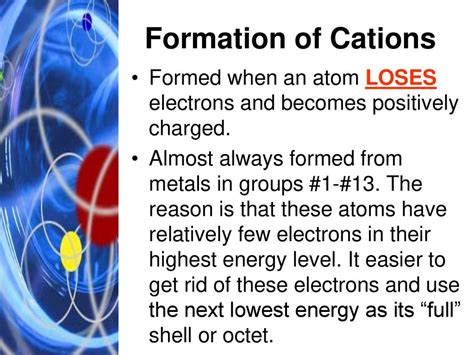Cations are positively charged ions that form when an atom loses one or more electrons. This process is known as ionization, and it can occur in various ways, such as through chemical reactions, heat, or radiation.
In chemistry, atoms are neutral particles that consist of protons, neutrons, and electrons. Protons and neutrons are found in the nucleus, while electrons orbit around it. When an atom loses an electron, it becomes a cation, which has a positive charge due to the loss of a negatively charged electron.
Cations play a crucial role in many chemical reactions, including acid-base reactions, oxidation-reduction reactions, and precipitation reactions. They are also essential in various biological processes, such as nerve impulses, muscle contractions, and protein synthesis.
There are several types of cations, including:
- Monoatomic cations: These are formed when a single atom loses one or more electrons, resulting in a positively charged ion. Examples include sodium (Na+), potassium (K+), and calcium (Ca2+).
- Polyatomic cations: These are formed when a group of atoms loses one or more electrons, resulting in a positively charged ion. Examples include ammonium (NH4+) and hydronium (H3O+).
Cations can be classified into different categories based on their properties, such as their charge, size, and reactivity.

How Cations Form
Cations form through various mechanisms, including:
- Ionization: This occurs when an atom loses an electron due to a chemical reaction, heat, or radiation.
- Electrolysis: This is the process of passing an electric current through a solution to cause a chemical reaction, resulting in the formation of ions.
- Acid-base reactions: These reactions involve the transfer of electrons between atoms, resulting in the formation of ions.
Cations can also form through the reaction of atoms with other elements or compounds. For example, when sodium (Na) reacts with chlorine (Cl2), it forms a cation (Na+) and an anion (Cl-).

Factors Affecting Cation Formation
Several factors can affect the formation of cations, including:
- Atomic radius: Atoms with a smaller radius are more likely to form cations due to their higher electronegativity.
- Electronegativity: Atoms with high electronegativity values are more likely to attract electrons and form anions, while those with low electronegativity values are more likely to lose electrons and form cations.
- Ionization energy: The energy required to remove an electron from an atom can affect the formation of cations. Atoms with low ionization energies are more likely to form cations.
Properties of Cations
Cations have several properties that are important in chemistry, including:
- Charge: Cations have a positive charge due to the loss of one or more electrons.
- Size: The size of a cation can affect its reactivity and ability to form bonds with other atoms.
- Reactivity: Cations can be highly reactive due to their positive charge, which can attract negatively charged electrons.

Applications of Cations
Cations have several applications in various fields, including:
- Biology: Cations play a crucial role in many biological processes, such as nerve impulses, muscle contractions, and protein synthesis.
- Chemistry: Cations are essential in many chemical reactions, including acid-base reactions, oxidation-reduction reactions, and precipitation reactions.
- Materials science: Cations are used in the development of various materials, such as batteries, fuel cells, and semiconductors.

Conclusion
In conclusion, cations are positively charged ions that form when an atom loses one or more electrons. They play a crucial role in many chemical reactions and biological processes, and have several applications in various fields. Understanding the properties and behavior of cations is essential in chemistry and other sciences.





What are cations?
+Cations are positively charged ions that form when an atom loses one or more electrons.
How do cations form?
+Cations form through various mechanisms, including ionization, electrolysis, and acid-base reactions.
What are the properties of cations?
+Cations have several properties, including charge, size, and reactivity.
We hope this article has provided a comprehensive overview of cations and their properties. If you have any further questions or would like to learn more about this topic, please feel free to comment below or share this article with others.
